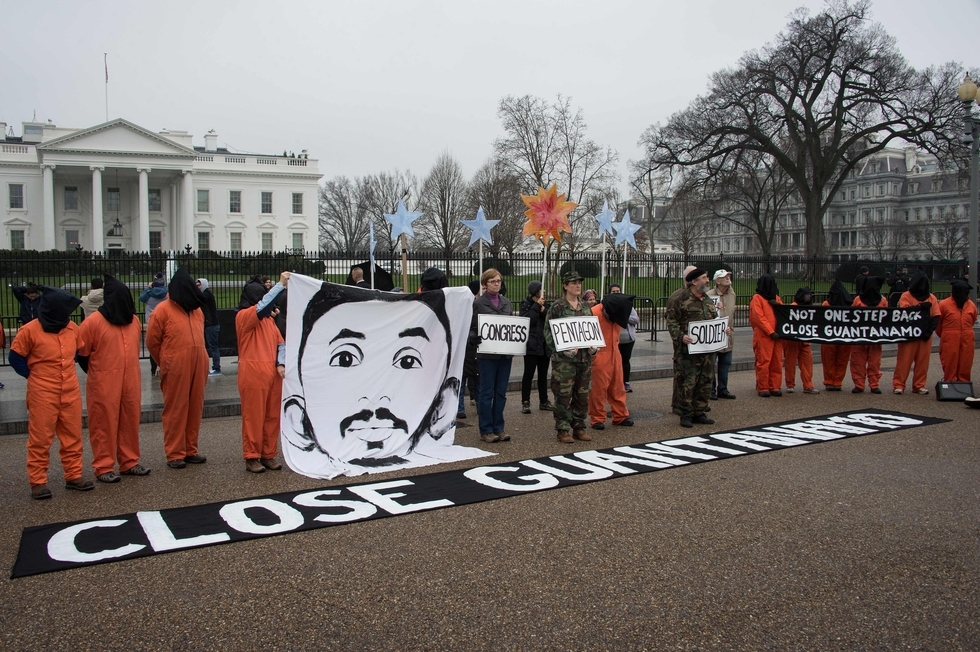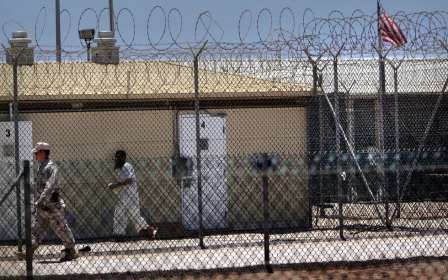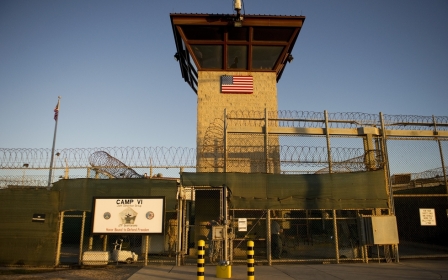Last Kuwaiti Guantanamo inmate returns home
President Barack Obama pledged to shut Guantanamo when he took office in 2009, but his efforts have been repeatedly thwarted by Congress

Protesters in prisoners' orange jumpsuits demonstrate for the closing of the Guantanamo prison (AFP)
Published date: 9 January 2016 12:10 GMT
|
Last update: 8 years 10 months ago
The last Kuwaiti prisoner in the US Guantanamo Bay prison returned home on Saturday to a family reception after 14 years of detention, the head of a detainee group said.
Faez Mohammed Ahmed Al-Kandari became the last of 12 Kuwaitis held for long terms in the prison as the United States prepares to close the facility.
"He looked tired but his morale was very high. He was welcomed at the airport by his father, two brothers and uncle," Khalid al-Oudah, head of the society of families of Kuwaiti prisoners in Guantanamo, who was also present, told AFP.
Kandari was immediately taken to a military hospital for medical examination where dozens of relatives led by his mother were allowed to greet and talk to him freely, Oudah said.
The former prisoner was brought back to the Gulf state aboard a private jet which flew from Guantanamo to the emirate via Casablanca, Morocco.
He had been held without trial in the Caribbean detention centre since 2002, and his return to Kuwait now means the facility has a population of 104.
President Barack Obama pledged to shut Guantanamo when he took office in 2009, but his efforts have been repeatedly thwarted by Congress.
Oudah said Kandari will remain in hospital for some time and only his close family members will be allowed to visit him.
He will then be taken to a rehabilitation centre for more than six months after which prosecutors will interrogate him and decide whether to pursue legal action, Oudah said.
Oudah thanked the efforts of Kuwaiti Emir Sheikh Sabah Al-Ahmad Al-Sabah and other authorities in securing the return of Kandari.
14 years without charge
In all, 45 of the remaining inmates have been approved for transfer, and the Pentagon is trying to find countries to take them. Many are from Yemen and cannot go back given the country's collapse into civil war.
US Defence Secretary Ashton Carter in December signed off on 17 of the 45 to be transferred as soon as this month, and officials say a further flurry of releases is expected in the coming weeks.
Even if all 45 are released, the remaining inmates are expected to stay in indefinite detention. These include the "9/11 Five," a group of five men accused of plotting the September 11, 2001 attacks that unfolded in New York, at the Pentagon and in the skies over Pennsylvania.
In the case of Kandari, the Pentagon released virtually no information about the detainee, as is typical with Guantanamo inmates.
According to his leaked 2008 prison file, published by WikiLeaks and the New York Times, the 40-year-old was a "committed member" of al-Qaeda and was an influential religious figure for the group's fighters in Afghanistan.
He was initially captured in December 2001 and sent to Guantanamo in May the following year.
Since 2002, a total of 779 detainees have been held at Guantanamo. Inmates are kept without recourse to the regular US legal processes and some likely will die in prison without ever being convicted of a crime.
New MEE newsletter: Jerusalem Dispatch
Sign up to get the latest insights and analysis on Israel-Palestine, alongside Turkey Unpacked and other MEE newsletters
Middle East Eye delivers independent and unrivalled coverage and analysis of the Middle East, North Africa and beyond. To learn more about republishing this content and the associated fees, please fill out this form. More about MEE can be found here.



